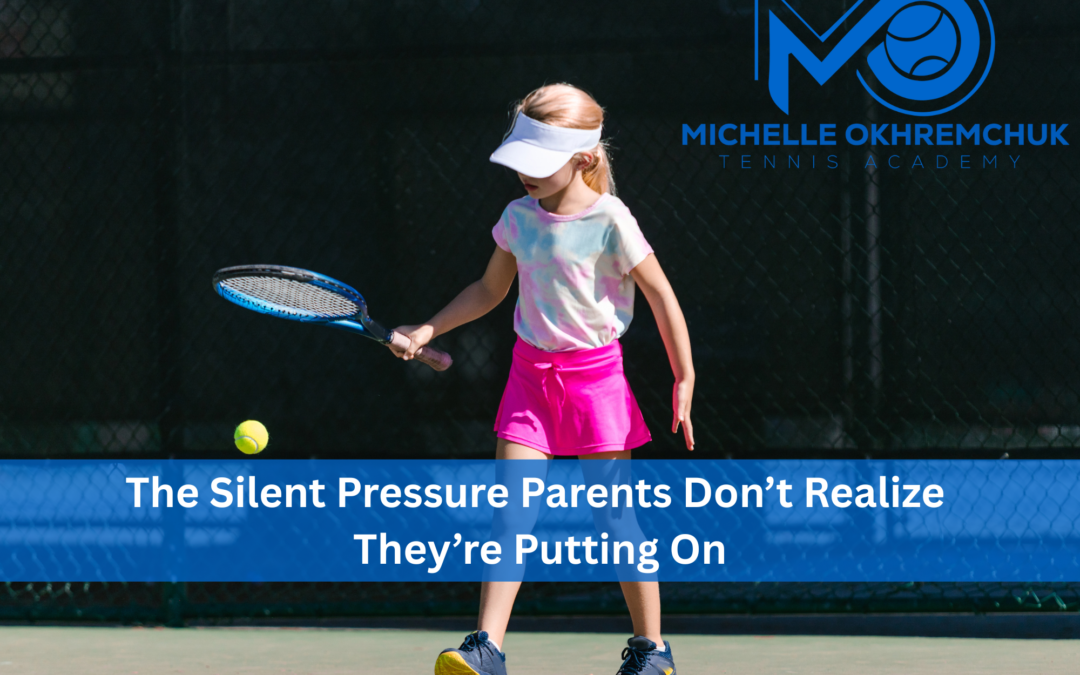Your child isn’t a reflection of you — they’re a person. `
If your child’s face falls the second they glance at you after a match — this article is for you.
As a coach, I get to watch your kids show up day after day. Some are confident. Some are nervous. Some are quietly trying to hold it all together. But what breaks my heart is watching a child walk off the court and instantly search for the look on their parent’s face, to know if they’re good enough today.
Not based on who they are.
But based on how they performed.
And most of the time, the parent doesn’t even realize they’re doing it.
Pressure in Disguise
It’s not always loud. It’s not always cruel. But it’s there — and kids feel it.
It sounds like:
- “We’re driving all the way here. I hope this is worth it.”
- “You’ve been practicing so much. How could you lose again?”
- “That match was a disaster. What were you even doing out there?”
- “We’re spending a lot of money on this, and it doesn’t feel like you care.”
Even something as simple as a sigh, a glance, or a disappointed silence on the car ride home can leave a mark. You might think you’re motivating them — but they’re hearing:
- “I’m not enough unless I win.”
- “My parent’s time, love, or pride depends on how I perform.”
One of my students recently told me she might stop coming to my clinics — not because she wasn’t improving or enjoying it, but because her parents were getting overwhelmed. Driving across town became “too much,” and they started hinting that she needed to “prove” the clinics were worth it.
That subtle pressure didn’t land on the parent. It landed on her.
Now she steps onto the court not just trying to improve, but trying to validate someone else’s stress.
They Hear It All — Even When You Think They Don’t
You think you’re whispering.
They’re absorbing every word. Every sigh. Every tone shift. And they’re carrying it onto the court like a backpack filled with bricks.
Kids are far more emotionally intelligent than we give them credit for. They pick up on resentment, judgment, stress, and unspoken disappointment — and they often internalize it as something being wrong with them.
When a child feels like they have to “earn” their ride, your approval, or the right to keep playing through performance, the sport stops being joy and starts becoming survival.
What Real Support Looks Like
Supporting your child in tennis (or any sport) doesn’t mean being perfect. It doesn’t mean never being frustrated. It means learning how to separate your emotional investment from their personal experience.
Here’s what real support looks like:
- Focus on effort, not outcome.
- Celebrate attitude, consistency, and showing up — not just wins.
- Trust the coach.
- Don’t coach from the sidelines or the car ride home. You hired someone for a reason.
- Let them lose. Let them cry. Let them grow.
- Failure isn’t the opposite of success — it’s part of becoming confident.
- Balance your stress privately.
- Your child isn’t responsible for your time, traffic, or emotional energy.
- Ask this after a match:
- “How did you feel about your game?”
- Not: “Why didn’t you win?”
- Not: “You were missing so much.”
- Just: “How did YOU feel?”
Give them the mic. You might learn something.
A Note to the Moms — Especially This Weekend
Moms, I see you. You’re juggling drop-offs, schedules, snacks, emotions — and you rarely get to hear “thank you” for it.
I know you want your child to succeed. I know you carry the pressure too. So on this Mother’s Day, this is your reminder:
• You’re allowed to exhale.
• You’re allowed to not have all the answers.
• You’re allowed to show up imperfectly — and still be everything your child needs.
Because the truth is:
They don’t need a coach. They don’t need a critic.
They need you.
To believe in them, even when they don’t believe in themselves yet. To hug them, even when they lose.
To remind them that their worth isn’t measured by a scoreboard.
That’s what builds champions — not just on the court, but in life.
What Coaches Wish They Could Tell You
Most of us coaches stay professional, respectful, and neutral because we love what we do. But here’s what I wish I could say to every parent at least once:
• Please don’t undo what I’m trying to build.
• Please don’t pressure your child into perfection before they even find confidence.
• Please don’t make your kid feel like they’re failing you.
I promise you — they’re trying. I’ve seen kids light up with just one moment of safety, one conversation that made them feel heard, one adult who didn’t judge them for missing a backhand.
You can be that person — not the critic, but the anchor.
The Bottom Line
You’re not a bad parent. But even the best intentions can become pressure if we’re not self-aware.
Your child doesn’t need you to be perfect. They need you to be present, calm, and supportive — even when they lose.
Especially when they lose.
Because one day, tennis will be over. But how they felt with you by their side? That will stay with them for life.
By Michelle Okhremchuk


